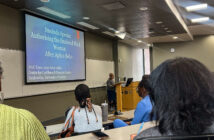How much does student input matter in terms of academics — especially regarding classes and professors?
Not much, as evidenced by the announcement of Beth Gallant‘s contract nonrenewal this past week.
Professor Gallant thought she would not be hired again for next year a few weeks ago, and a group of students created an online petition to encourage others to fight to keep her. The petition received hundreds of signatures and comments for Gallant — including testimonials from alumni, saying that Gallant got them their first jobs.
Students also sent the faculty and administration letters explaining what an asset she is to the marketing department.
We do not know if this factored into the provost’s decision at all, but it clearly was not enough.
Does student input — especially collective input like this — matter? Should it? Would it have mattered more if it came from a group of alumni who worked together to put forth the petition and threatened to withhold a sizeable amount of donations?
After all, we are only students, and most of us will continue to attend and pay for Lehigh even if the administration makes decisions we do not agree with. Other than our discontent and righteousness, the university does not have much to lose when making a faculty decision that students do not support.
This may be the reason why it seems as though student input is not considered much, especially in its most common form — course evaluations. Awful professors who receive bad reviews year after year never change or still receive tenure. The amount of information relayed to the chair varies by department, but some only receive the averages of the answers to a few questions — and none of the write-ins, which are often more colorful and honest than a few multiple-choice questions.
Some may argue that student input should not be considered too much. A disgruntled student who is failing the class may not give a reasonable course evaluation. Some students may prefer easy professors who give very little work — traits that the administration do not agree with nor are ones that will improve Lehigh’s academics. There are also other factors that some may consider to be more important, like a professor’s research and other credentials that bolster a department’s standing.
Lehigh requires all professors to publish articles and books before being considered for tenure. However, we have all benefitted from the university’s similar emphasis on teaching in the classroom. These two priorities often conflict, but the administration needs to work to ensure they do so as little as possible.
There have been many rumors surrounding Gallant’s departure — that she was mistreated in the department because she was a female or that the administration did not like her emphasis on careers and real-world experience.
Regardless of the motivation for her departure, one thing is for certain — Professor Gallant affected many students’ lives at Lehigh.
The testimonials discuss that she was a confidant and mentor, listened to students, and had a practical approach to marketing, which students liked.
Aren’t these traits important in a professor — someone who is a resource and mentor yet also prepares us for the work force? What more could you want from a professor?
Imagine your favorite professor at Lehigh. Maybe it was a professor in a class you were randomly placed in freshman year but who engaged you in a topic you knew nothing about. Maybe it was a professor who helped you work through personal issues and advises you about potential careers. Maybe it was your research advisor with whom you’ve worked for dozens of hours and you know you’ll have a lifelong connection.
Our favorite professors — the ones who inspire us and challenge us, support us and advise us — are not the ones that give us easy A’s. The university needs to recognize that when students are so vocal about a professor — either through a petition, or in more systematic ways like course evaluations — it means something. While we procrastinate our papers or cram for exams, we value our educations, and the professors who provide us with them.





Comment policy
Comments posted to The Brown and White website are reviewed by a moderator before being approved. Incendiary speech or harassing language, including comments targeted at individuals, may be deemed unacceptable and not published. Spam and other soliciting will also be declined.
The Brown and White also reserves the right to not publish entirely anonymous comments.